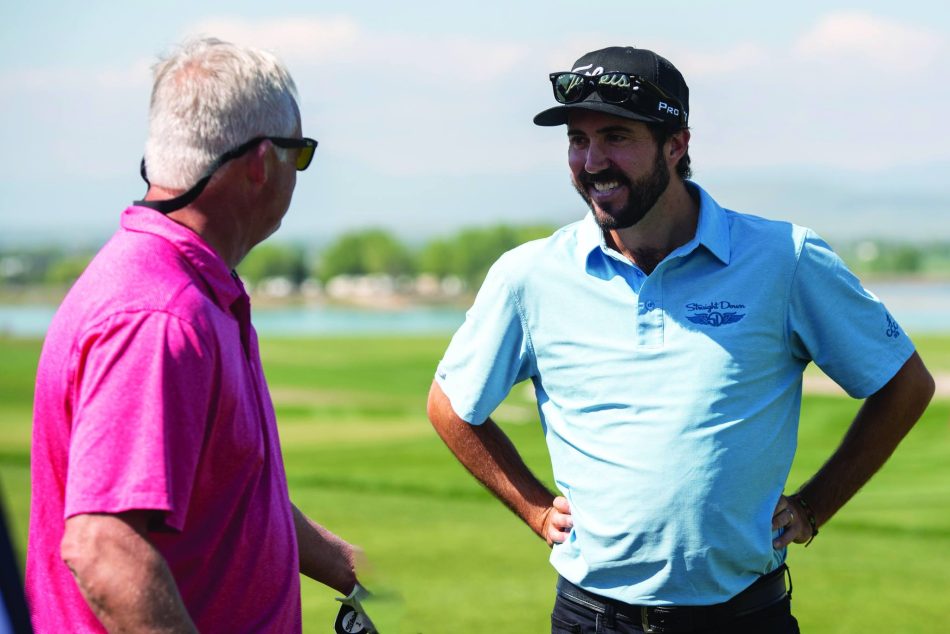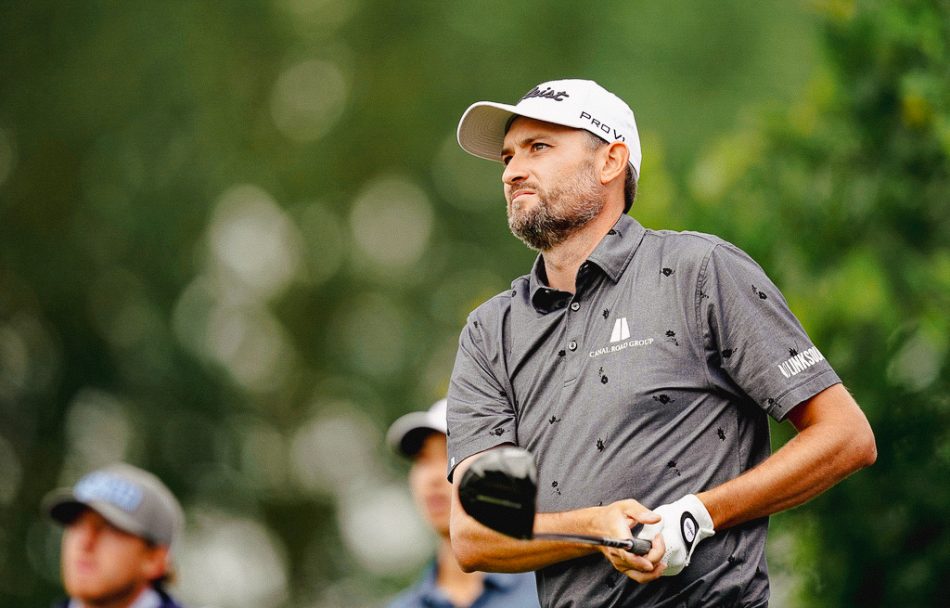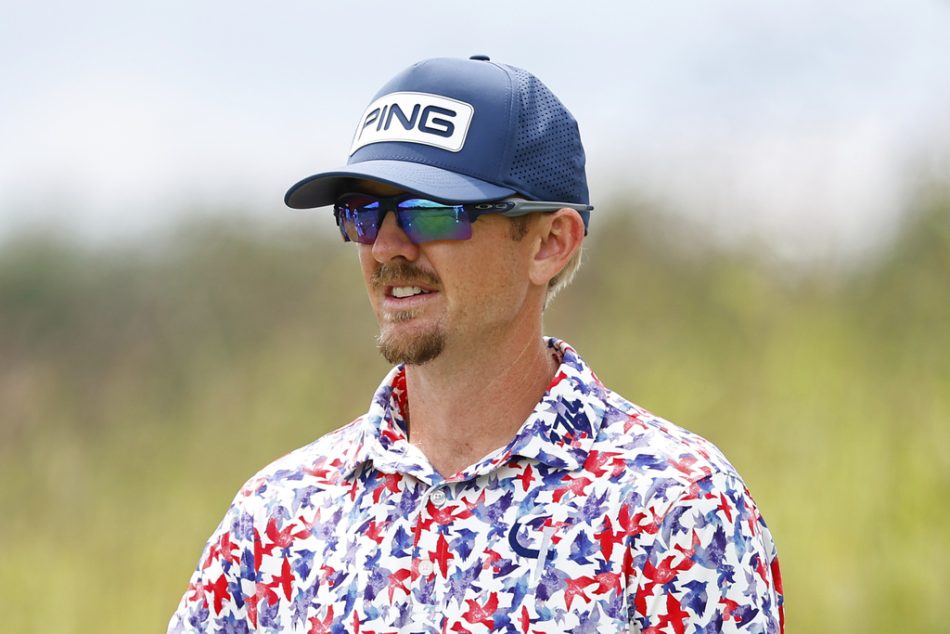Aurora’s Davis Bryant hopes to keep a good thing going
Aurora native gets pair of Top 10s in his second pro season
By Jim Bebbington

Touring professionals Mark Hubbard, Jim Knous and Gunner Wiebe all know the grind of obtaining and keeping access to the top golf tournaments in the world. Knous grew up in Colorado and has split his 12-year career between the PGA Tour and the Korn Ferry Tour; he retired this year from full-time PGA Tour golf to take a job with Ping Golf. Gunner Wiebe is the son of long-time professional Mark Wiebe and grew up locally and is playing in 2024 on the European DP World Tour. PGA Tour pro Hubbard is ranked near the top 100 golfers in the world and grew up playing golf and basketball in Lakewood. All three are hard-working touring pros – none has yet to win a PGA Tour start, but all have had success. All three were interviewed by email separately and offered their thoughts and advice on the touring golf life and how to get there.
What are you most proud of from your 2023 season?
Hubbard: How hard I fought and how I worked. Played 39 events (PGA Tour record) during the ’22-’23 season. That’s a ton of golf (probably too much) but I fought for every round.
Knous: I’m most proud of how I battled throughout the season, even though I wasn’t playing my best golf. It’s never fun to play below what you think your potential is, but it’s always important to keep fighting to try to reach that level.
Wiebe: It probably has to be earning my way into my first major championship with a T2nd place finish at the British Masters. I’m proud of a few things but that one had a more tangible result.
What is the one thing you would change if you could about life on the road/travel as a touring professional?
Hubbard: Probably just the schedule. I would love to play less and also play a more locationally sound schedule. We play a lot of events where we have to hop all over the country and most of the time we are playing in regions of the country at off times of year (rainy season in Texas for example). It is cheaper for the Tour this year but makes it so we aren’t always playing courses during the best conditions and weather.
Knous: I would love to have my family travel with me every week. Life on the tour can get a bit lonely week after week being by yourself, and having them there with me would make it much more enjoyable.
Wiebe: Without question, it would be the time away from my family. I love competing and love the game, but I hate being away from my wife and daughter. Perhaps teleportation would be the answer.

What are you most looking forward to in 2024?
Hubbard: The opportunity to qualify for some of the signature events and start getting into more majors.
Knous: I’m looking forward to starting a new dream! As you may know, I lost my status on both the PGA Tour and the Korn Ferry Tour, and having not advanced through Q School Second Stage, I don’t have a tour to play on. So at this time, I’m going to be looking in a different direction than playing full-time. Of course, I’d love to stay in the golf industry in some capacity, and hopefully there is an opportunity that will be exciting and fulfilling.
Wiebe: I’m looking forward to knowing most of the courses and being able to set my schedule, a luxury I did not have last year out of the q school category. Not only will preparation be better because of the familiarity, but it will provide the opportunity to actually visit some of the amazing sites in the cities we play.
If you could play great in any one tournament in 2024, which would it be and why?
Hubbard: The Players. Out of all our tournaments if I could win one that would be it. Huge purse. Great golf course. Phenomenal atmosphere. Truly is the 5th major.
Knous: I’m hoping to qualify for the US Open at Pinehurst and of course I’d love to play well there. My Colorado School of Mines teammates and I went on a trip to Pinehurst Resort this fall and played five courses, including Pinehurst #2. It was an incredible experience and an unbelievably hard golf course. Hopefully, I get the chance to go back and play it again for the U.S. Open!
Wiebe: Of course the easy answer is any big event or Rolex series event, like Dubai or Wentworth. The truth for me is any tournament where I have family attending. There’s something special about performing well with your loved ones near. I know my wife wants to go back to Switzerland so maybe the Omega would be a good one to choose.
What is a piece of advice that has helped you in the mental side of the game that you think amateur golfers could benefit from?
Hubbard: You don’t have to play perfect to play well. Most of my great events are honestly when I have like my “B” game. Acceptance is key and it’s easier when you aren’t firing on all cylinders sometimes because you put less pressure on yourself and just play golf.
Knous: In my opinion, the most important part of being consistent is working on your pre-shot routine. I consider this part of the “mental” side of the game because it requires a lot of mental fortitude and practice. The goal is to have the exact same routine on every single shot. Dial in exactly what you want to do pre-shot, and even what you want to think. Plan out the shot in your head before you step into the ball. Then once you step into the ball do a quick routine (waggle, look at the hole, wiggle your toes, etc.) and pull the trigger with only the target and shot plan in your head and nothing else. Working hard on your pre-shot routine will make you a more consistent player.
Wiebe: Kind of a two-part answer but two phrases for me I have been given by my sports psychologist, Dr. Deborah Graham, that have stuck with me. 1) To mentally be where you physically are. My mind wanders to other places often, especially to my family. It’s not necessarily a bad thing but for the six or seven hours a day of tournament golf and preparation, you need to be more disciplined in the statement above. 2) It kind of ties in with the first: Control what you can, not what you want to. I see a lot of amateurs trying to overcomplicate the game because they read about strategies or someone told them what professionals think about in preparing for a shot. If you’re an amateur, and you carry a 7 iron 150 yards, then that’s what you can do. You might want to hit a 9 iron but that’s something you want to do. Be good at being in control of what you know and can do.
A few of your golf friends are coming to Colorado for a long weekend – what two courses do you recommend they play to have the most fun?
Hubbard: If they can get on private courses then I’d say Bear Creek CC and Cherry Hills CC. If public then Arrowhead GC and The Ridge at Castle Pines North
Knous: Take a trip west from Denver up the I-70 corridor and go visit Red Sky Golf Club. Both courses, the Fazio and the Norman, are phenomenal. Super fun to play and both offer a stern test of all your golfing skills.
Wiebe: Public course- Fossil Trace and the Broadmoor. Private course- I grew up at Cherry Hills and Colorado Golf Club so it would have to be those two.

What other activities or sports do you think junior golfers should consider to help them grow and develop as people and players?
Hubbard: Any team sport. It will help grow as a person for sure. Golf is a lonely game sometimes and you need that team/group mentality to push you to grow sometimes. As far as athletically playing any other sport will help you with body awareness and will be useful in many ways for golf like awkward lies and feel shots.
Knous: As a kid, I always enjoyed playing multiple sports along with golf. I don’t think there are any specific sports you can play that would directly improve your golf game, but playing any other sport will help with endurance, mental sharpness, competitiveness, resiliency, and more. There are attributes you will take from other sports that you can apply to golf.
Wiebe: I’m a big believer in playing as many sports as possible. I think they all can benefit one another with dynamic movements, teamwork, strategy, discipline and toughness. I played every sport under the sun and was a three-sport athlete in high school until my junior year where I went down to two. I think basketball is a great sport for dynamic movement that has become so important in modern golf.
What advice would you give junior golfers as they try to figure out a balance between golf and other sports and activities they might want to try?
Hubbard: Practice as much as you want to. If you have a burning desire to go beat balls on the range all day or chip and putt for hours, by all means go do it. But don’t let it become a job that you resent and feel obligated to do. There is definitely such a thing as over practicing so try quality not quantity. It will help make you better and keep you from burning out.
Knous: In my opinion, every junior golfer should be involved with other activities outside of golf. One way to accomplish this, which I thought my parents did well, is to play a different sport (or take part in a non-sport activity) each of the four seasons here in Colorado. For example, when I was growing up, I played baseball in the spring, golf in the summer, basketball in the fall, and I skied in the winter. This helps your brain train in different ways and also gives you a break from each sport so you are ready to give it your all when the time rolls around again!
Wiebe: I’m sure I fall in the minority opinion here, but I’m an advocate of breaks from golf growing up to explore other sports and activities. In the winter, I was not indoors hitting balls or doing any golf-related activity until I was about 17 and knew I was going to play college golf at University of San Diego. I think with any sport, golf specifically, it’s so easy to get burned out. I think the most important part of developing as a young person is to simply be a young person. Supervisors, mentors and coaches are so quick to try and get kids to specialize in sports. I’m not saying that doesn’t work, but I know it would not have worked for me. I needed to play other sports and be a teammate to not feel isolated and like golf was a job. Kids should be allowed to be kids, find out what they do and do not like and only when it’s the decision of the kid to become specialized is that the right time to do so. There is no rule that says you have to be a world-beater when you are 16 to play professionally. I just turned 35 and I think my best golf is ahead of me. Staying busy, active, and enjoying a childhood is the best advice I could give and if that ultimately means playing golf into college and beyond, then that’s a bonus.
Editors Note: This article was modified after it was originally published to reflect Jim Knous’ change in career.
Colorado AvidGolfer Magazine is the state’s leading resource for golf and the lifestyle that surrounds it, publishing eight issues annually and proudly delivering daily content via coloradoavidgolfer.com.
Follow us on Twitter, Facebook and Instagram
Jim Bebbington is the Director of Content at Colorado AvidGolfer. Contact him at [email protected]
Aurora native gets pair of Top 10s in his second pro season
Quail Dunes is one of the best eastern Colorado courses
The Beast of Berthound Returns at The Ascendant Presented by Blue
Callaway’s new X-Forged and X-Forged Max irons reject tech clutter in favor of old-school austerity